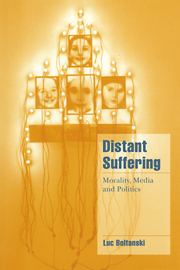4 - The topic of denunciation
Published online by Cambridge University Press: 22 September 2009
Summary
From indignation to accusation
Faced with the spectacle of an unfortunate suffering far away, what can a morally receptive spectator do when he is condemned, at least for the moment, to inaction? He can become indignant. Becoming indignant passes through pity, for if one does not feel pity why would one become indignant (just as the revolt of someone who feels himself to have been offended passes through self-pity, which helps explain the constraints on its public expression). But pity is transformed by indignation. It is no longer disarmed and powerless, but acquires the weapons of anger. It is in this sense that we can say that it points toward action since anger, which is an emotion of actors, prepares or – as might be said in the Sartrean terms of a denunciation of emotional bad faith – simulates commitment in a situation in which it could be realised in actions. What kind of actions would these be? Quite clearly, of a violent kind. But this violence at a distance, and so without any physical contact, is condemned to remain verbal. The speech act which expresses it is an accusation.
Clearly, the accusation is not addressed to the unfortunate himself. The transformation of pity into indignation presupposes precisely a redirection of attention away from the depressing consideration of the unfortunate and his sufferings and in search of a persecutor on whom to focus. It could by this be said to be encouraging.
- Type
- Chapter
- Information
- Distant SufferingMorality, Media and Politics, pp. 57 - 76Publisher: Cambridge University PressPrint publication year: 1999

